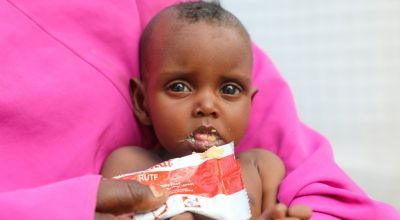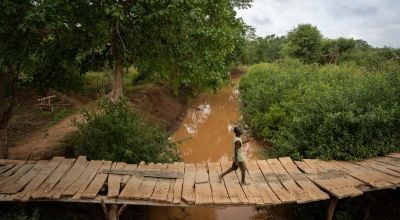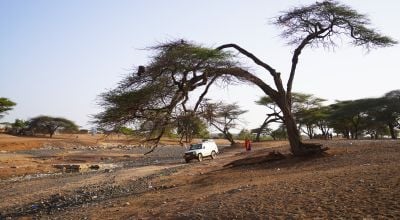
Read our 2023 annual report

Knowledge Hub
How mobile cash transfers save lives and empower locals in Somalia
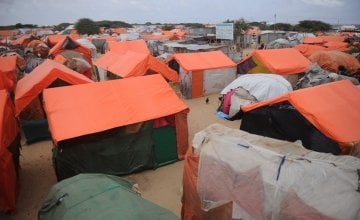
Cash is revolutionising the way that humanitarian aid is being delivered. Somalia is a prime example of this, where in coordination with donors such as European Commission’s Civil Protection and Humanitarian Aid department (ECHO) and Irish Aid, Concern is finding innovative ways to ensure that those most in need are reached while empowering them along the way.
Since the devastating famine in 2011, cash transfers have been used in Somalia to meet the immediate needs of communities while building their resilience to future shocks. This is based on a sound understanding of what communities affected by crises – such as conflict, drought and displacement – really need, and what works best to respond to those needs.
Between 2016 and 2017, Somalia experienced four consecutive below average or failed rainy seasons, and was on the brink of famine again in 2017. These dire circumstances provided another opportunity for cash to show just how effective it can be in saving lives and alleviating suffering. So, why does it work so well?
The benefits of cash transfers
Cheaper, faster
Let’s imagine there is a community in the middle of the desert who desperately need food, and fast. You decide to load a plane with supplies, but first you need to source the supplies, charter a plane, find an airstrip to land it, and then there is the matter of getting the supplies from the airstrip to the villages. Roads are impassable or armed groups block the only route. All this can take weeks, or even months, and ships and planes and trucks are expensive. Cash is different - cash reaches further for less. What’s more, it’s fast, really fast. In 2018, Concern was able to mobilise following floods and cyclones and within 48 hours send enough money for families to buy life-saving supplies.
Sustainability
Cash is particularly effective in Somalia because local markets are most often functional, even in those places which are difficult for aid agencies to reach with more traditional interventions. This means that as soon as a family receives their mobile money transfer, they can purchase goods in the local market. This in turns drives the local economy, ensuring local farmers, traders and shop owners have a continued market for their produce.
Dignity and choice
Concern’s cash programming in Somalia is unconditional and multi-purpose, meaning that families can make the decision to use it for their most pressing needs at that given time. Extensive research shows that in Somalia the urgent need is most often food. However a sick family member may need medication or a damaged shelter may need repair. Cash allows for that choice. What’s more, unconditional multipurpose cash transfers empower people, and put the responsibility in their hands to enable them to escape poverty.
Smart, efficient, coordinated
Concern works very closely with other agencies and local partners to coordinate and harmonise approaches to select those most in need, deliver the cash effectively and ensure maximum impact. In Somalia we first work with partners to identify communities and families most in need and to ensure as many communities as possible are reached. Then we work with telecommunications companies to register phone numbers or distribute sim cards to those that don’t already have them. The recipients then receive an SMS to say they have received the cash transfer and they go to a shop to buy what they need and enter a secure PIN to spend the money. All of this is facilitated by an extensive mobile phone network, which allows us to reach even the most remote villages. When the cash transfers are complete, Concern engages in extensive follow up with families to take on board feedback and conduct research on the impact that the cash transfers have.
What is most important about all of the above facts, is that when conditions are right, cash transfers can provide more effective life-saving support than traditional humanitarian interventions. Because of the coordinated efforts of Concern and other actors and a heavy reliance on cash transfers, a major famine was averted in Somalia in 2017.
Real cash, real change
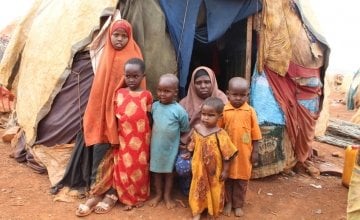
Khadra* and her family were one such family who were supported through cash transfers. In 2016, Khadra, her husband and their family of seven children returned home to Somalia from Kenya with few possesions. The gruelling journey of 90km took 12 days on foot and cost her husband his life as he died from illness along the way. Khadra and her children survived on the generosity of locals they met along the way, who offered water, food and other assistance. When her family reached their destination, she joined an Internally Displaced People (IDP) settlement. For months, Khadra would work in any casual labour she could in order to feed her children. With little time available to care for them, Khadra sought the support of relatives when times got particularly tough.
Fortunately, after ten months in the camp, Khadra and her family were registered for support by Concern’s Unconditional Cash Transfers (UCTs). This cash support is provided to the family via mobile money transfer, an assistance Khadra describes as a “big relief”. Khadra is now able to cover the most pressing costs for her family – food, debt repayment, clothes and medicines.
During the dry season, Khadra’s family also benefited from water trucking, ensuring they had clean, fresh water as well as receiving a mosquito net to prevent malaria. Two of her children, Sahra* (12) and Liban* (8), are now able to attend a local Concern run school and both students are doing well with their studies.
A lot has been, and still is being done by Concern for the good of the poor in these settlements."
A back-up for those who suffer through crises
Mother of five, Naima*, has lived in an IDP settlement for the past two years. Her family is one of many whose lives have, to some extent, changed with the support of cash transfers. A near constant cycle of drought and conflict had forced her family to flee a number of times, but now she says that her family has recovered from these difficulties thanks to the cash transfers. They have been able to meet their basic daily living costs and her oldest daughter, Ayaan* was able to go to school. In addition, income from their own farm harvests helped them buy some goats.
Sending messages of thanks to anyone who has shown the kindness of their support in the past Naima asks for that support to continue, adding:
The continuation of humanitarian aid from Concern is always a backup for those suffering in this context."
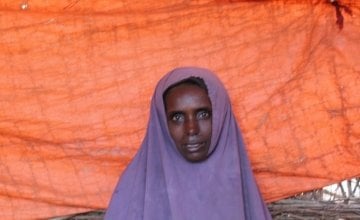
The future is cash
In recent years, the use of cash transfer programming in humanitarian assistance has grown significantly. In 2016, it was estimated that $2.8 billion in humanitarian assistance was through cash and vouchers, an approximate 100% increase from 2014. Cash is widely recognised as one of the most significant areas of innovation in humanitarian assistance, with huge potential to meet more needs, more efficiently and more effectively.
In Somalia, Concern has proved that mobile money transfers save money and save lives, meaning that we can reach more vulnerable people who are in need of our help. The Somali Cash Consortium, led by Concern in co-ordination with other aid agencies and funded by ECHO, was formed in January 2018. Throughout the year, the consortium distributed more than €15 million to over 300,000 beneficiaries through mobile-money transfers.
The consortium and its partners were able to respond quickly to several sudden-onset crises during 2018 including a cyclone in the north of the country and severe flooding in the south. By providing further assistance to already registered families, Concern were able to provide cash assistance in advance of more traditional assistance.
*Names changed to protect identities
Support our work in Somalia
This Christmas we are asking our supporters to support children in Somalia who are going hungry because of conflict and other crises. Your support will save lives. Please donate today.



